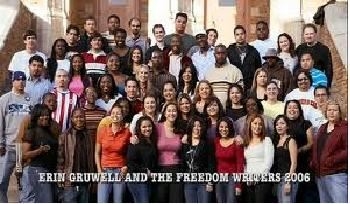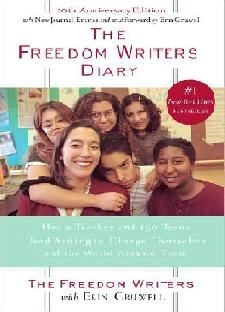 |
| Erin Gruwell ( (wkunews.wordpress.com)) |
Sitting at her desk, cluttered with journals everywhere, the woman flipped through another student's journal. It's late, but the woman stays in her spot, too engrossed with what she's reading. She couldn't help but gasp in shock at what happened in another student's life. Inside the content of this journal was the life of a troubled student from the ghetto, a story written and shared only because of the very woman reading the journal. Each student challenged themselves to share his or her story with the world, all because of this woman who believed their stories were worth sharing. Erin Gruwell, a "preppy-looking teacher" (Wride) stuck out a teaching job in a ghetto area of Long Beach, California. We credit Gruwell with "transforming her students into a community of writers" ("The Freedom Writers") just from her first introduction as a teacher. Gruwell is a teacher at Woodrow Wilson High School and has stayed with the same 'troubled' students through their high school years. Her students were all at-risk of learning and labeled as 'too-hard-to-teach’. The other teachers claimed it was impossible and gave up on them. The only admission staff to support Gruwell in completing the 'impossible' were Sabrina Arney and Dr. Carl Cohn. Gruwell "engaged her students considerably beyond the confines of her classroom and, in the process, successfully applied many of the `best practices' involved in teaching and learning" (Haglund). A hero must possess selflessness and care for the ones he or she helps. A hero must possess open-mindedness and be willing to try new ideas. And a hero devotes to his or her cause, and stops at no means to help it. By saving a class of underprivileged students, Erin Gruwell expresses selflessness, open-mindedness, and devotion to affirm that she deserves the title hero.
Erin Gruwell's selflessness derives from her motive to stay in a 'ghetto' area and work with students who require extra time and practice. Gruwell's success in changing lives can be credited with the organization set up by her and her class. "The Freedom Writers Foundation impacts educators, students and communities across the nation through its core programs and operations" (Gruwell). This organization, started from her class in Room 203, shares her style of teaching cross country to help students just like her own. As president, Gruwell devotes her free time to maintaining this Foundation, while still running her teaching career. Challenged with students that 'couldn't be taught,' Gruwell stayed, to ensure that they did learn: "However, in the course of just four years, Erin managed, dramatically so, to change the lives of her 150 students, many of whom had never succeeded academically and several of whom had records as gang-bangers and taggers. With uncharacteristic zeal, Erin engaged her students considerably beyond the confines of her classroom and, in the process, successfully applied many of the `best practices' involved in teaching and learning" (Haglund). Just working with students is challenging enough, but to work with ones who 'have never succeeded academically' or are part of gangs requires extra time and effort. Not only did Gruwell supply this extra time, she actually taught and changed their lives. Gruwell worked with her students to make sure they fully understood a topic and changed their lives in and out of school. Erin Gruwell, along with her students, proved others wrong by making her number one priority to teach these students.
 |
| Erin Gruwell and the Freedom Writers ( ()) |
Instead of giving up on her students, Erin Gruwell found a more inventive way to teach them, proving her open-mindedness. She started this new method by bringing in information the students could connect with. "Erin dispensed with the textbooks and brought in books by teens that had lived through racism and warfare, such as Anne Frank and Zlata Filipovic. This time, the students made a powerfully emotional connection. With Erin, they began to document their own lives in individual, anonymous diaries. They called themselves the "Freedom Writers," to honor the Civil Rights activists known as the Freedom Riders. As they wrote, the class made a firm and lasting commitment to change" ("The Freedom Writers"). Gruwell sought out the essential tools that would match her students and which lessons would affect them the most. Her choices and lessons were strictly ones that Gruwell believed her students could connect to. This change from textbooks helped the students become more committed to learning. By focusing more on the students' needs, Gruwell ensured trust between her and her students, which led them to being more open to learn. "Another student who credits Miss G with having given him his second chance in life commented, 'She doesn't give us any fake kind of stuff; she DOES things.' Another young man added that Miss G WILL NOT accept failure because, she says, that means that she has failed. 'She just doesn't take excuses from us; I guess that's why our parents like her so much.' Since students' testimonials of their respect and adoration for Miss G are legion, others in the room echoed their classmates' statements and added that she shows them how to take learning and apply it. 'But,' they emphasized, 'Miss G's most special quality is that she listens--and talks with each of us. And we don't talk back to her because she doesn't talk down to us'" (Haglund). Instead of just speaking, Gruwell acted. She showed her students that they were learning useful information which can help them. She changed their perspective by understanding them first. Instead of shoving a book in their face, she gave a relative example to her students. Erin never judged her students on their background, race, or ability. She expected each and every student to succeed, and pushed them to try their best. Erin Gruwell is open with her teaching style, her understanding of others, and her students.
Through time and devotion, Erin changed her students' attitudes and taught them how to learn. As a fresh new teacher, the school’s staff could assume that Erin would have a hard time, especially in the 'ghetto' area of town with her new class where: "Her students had been labeled "unteachable" by school administrators" ("The Freedom Writers"). Gruwell, appalled that the teachers and fellow students agreed that her class was 'unteachable', believed that anyone could learn and had the right to learn. She wanted to prove those teachers, and the rest of society, wrong, so she stayed and completed the unthinkable task of helping these students graduate. For Gruwell to prove the school wrong, she first had to get her students on track and encourage them to learn. "The 150 freshman who drifted into Room 203 had already been dubbed as the school's "rejects." Sure enough, that hurtful judgment was reiterated several weeks later when I was told that my students were "too stupid" to read a book from cover to cover. My students were far from stupid, but they had certainly given up on education. They felt as if they had no reason to care about school; the potential rewards of college and a career seemed remote, even alien" (Gruwell).These students knew what everyone else thought of them, and they let those titles stop them from achieving their full potential. Erin Gruwell opened up the prospect of learning to these kids. She made sure each and every one of them wanted to learn or become successful and continued on from there, because otherwise, her dedication would be in vain. Unlike others at the school, Erin Gruwell never gave up on these students, and entrusted herself with teaching them how to learn.
 |
| Millions of copies sold. ( (bookercritics.wordpress.com)) |
By saving a class of underprivileged students, Erin Gruwell expressed selflessness, open-mindedness, and devotion to affirm that she deserves the title hero. Instead of giving up on a troubling class, Gruwell challenged herself and invented her own ways of teaching that benefited her students. Erin Gruwell inspires me, along with others because she sees the world through clear, non-judging eyes: "Gruwell hopes to instill in her students two things: the knowledge that one person can change the world, and that each of them is that person. Already, the Freedom Writers mentor younger students in the community and speak to aspiring teachers about tolerance and looking beyond skin color" (Wride). As a teacher, adding these two focal points to a student's life can impact and change his or her life forever. I also find Gruwell's well completed task of proving those other teachers wrong inspiring. She truly believed in those students and went against all odds to make them believe in themselves. With each journal read, the woman helps all 150 students publish them. Each of their stories became known to the public and started a chain reaction in other areas. More than a million copies were sent across not just the country, but the world. The stories of their lives come in different languages ranging from Chinese to Spanish. It’s hard to believe that this mass-effect all started in a classroom, Room 203, with 150 underprivileged students and one woman, named Erin Gruwell.
Works Cited
Gruwell, Erin. "The True Story." Freedomwritersfoundation.org. 2006. Web.
Haglund, Elaine. "What's Right With Education? Erin Gruwell's Reconnecting The Disconnected." Education 119.2 (1998): 300. Gale Biography In Context. Web. 14 Dec. 2011.
"The Freedom Writers." Instructor 114.4 (2004): 27. Biography Reference Center. Web. 12 Dec. 2011.
Wride, Nancy. "She Opened Their Eyes and They Opened Up Their Lives - Los Angeles Times." Featured Articles From The Los Angeles Times. 14 Nov. 1997. Web. 14 Dec. 2011.
Page created on 1/16/2012 12:00:00 AM
Last edited 1/16/2012 12:00:00 AM
The Freedom Writers Diary: How a Teacher and 150 Teens Used Writing to Change Themselves and the World Around Them - Erin Gruwell and the Freedom Writers
Teach with Your Heart: Lessons I Learned from the Freedom Writers - Erin Gruwell
Teaching Hope: Stories from the Freedom Writers Teachers - Erin Gruwell
